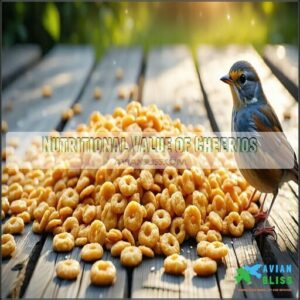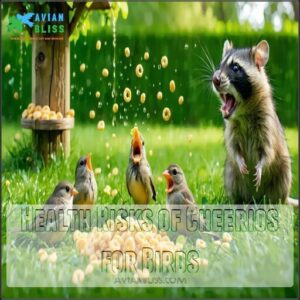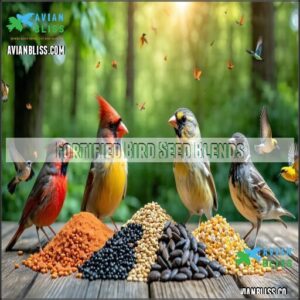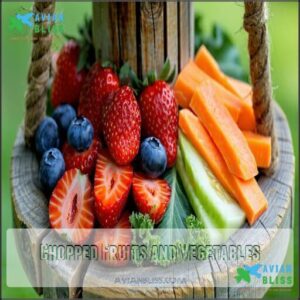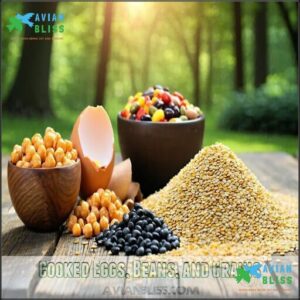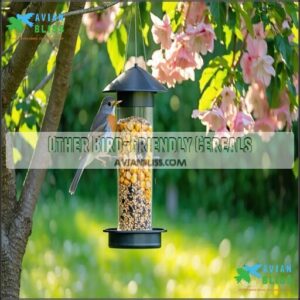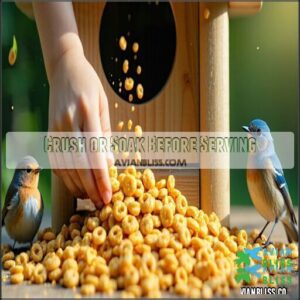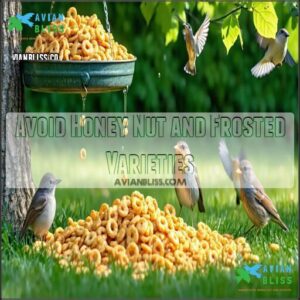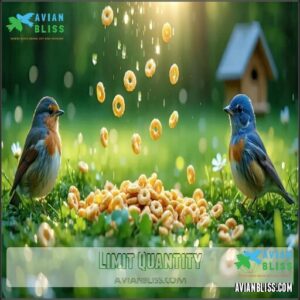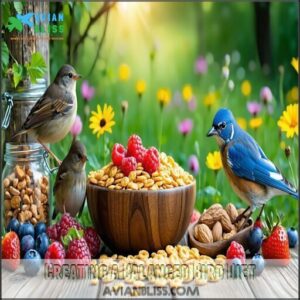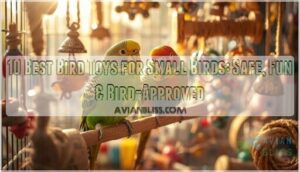This site is supported by our readers. We may earn a commission, at no cost to you, if you purchase through links.
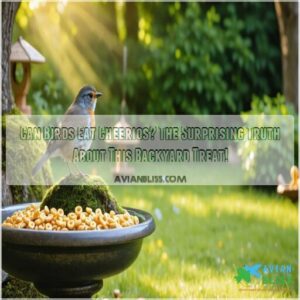
Cheerios are made from whole grains, which are fine in small amounts, but they’re low in the protein and fats birds need for energy.
Avoid sugary varieties like Honey Nut or Frosted Cheerios, as those can harm their health.
If you do offer Cheerios, crush or soak them first to prevent choking, and only give a few pieces as an occasional treat.
Birds thrive on a varied diet, so stick to natural foods like seeds, fruits, and veggies for their main meals.
Curious about bird-safe alternatives? Keep reading!
Table Of Contents
- Key Takeaways
- Can Birds Eat Cheerios?
- Nutritional Value of Cheerios
- Health Risks of Cheerios for Birds
- Best Alternatives to Cheerios
- Other Bird-Friendly Cereals
- Tips for Feeding Cheerios to Birds
- Creating a Balanced Bird Diet
- Frequently Asked Questions (FAQs)
- Can birds eat Cheerios cereal?
- Can birds eat Maple Cheerios?
- Are Cheerios good for birds?
- Can I give Cheerios to my Pet?
- Can birds eat Honey Nut Cheerios?
- Are General Mills Cheerios good for birds?
- What Types of Cheerios Are Safe for Birds to Eat?
- How Much Cheerios Should Be Given to Birds?
- Are There Any Alternatives to Cheerios for Birds?
- Are There Any Risks Associated With Feeding Cheerios to Birds?
- Conclusion
Key Takeaways
- Stick to plain, original Cheerios and avoid sugary varieties like Honey Nut or Frosted Cheerios to keep birds safe.
- Crush or soak Cheerios before feeding to prevent choking, especially for smaller birds.
- Offer Cheerios sparingly as an occasional treat and prioritize natural foods like seeds, fruits, and veggies for a balanced diet.
- Overfeeding Cheerios can lead to health risks like obesity, nutritional deficiencies, and digestive issues in birds.
Can Birds Eat Cheerios?
You can feed birds Cheerios as an occasional treat, but you should choose original Cheerios over sugary varieties for their health.
Birds benefit from the whole grain oats in plain Cheerios, though these shouldn’t replace their natural diet of seeds, nuts, and insects, which is essential for their overall well-being and health.
Whole grain oats in Cheerios offer birds quick energy but can’t replace their essential diet of seeds, nuts, and insects.
Safe Feeding Practices
Bird enthusiasts should follow these safe feeding guidelines when offering Cheerios to your backyard visitors:
- Choose plain, original Cheerios with lower sugar content
- Break larger pieces into smaller bits to prevent choking hazards
- Place in elevated feeders away from cats and other predators
- Limit serving size to a small handful per feeding session
Always monitor birds after introducing Cheerios to confirm proper consumption.
Maintain clean feeders with fresh offerings.
Remember that Cheerios should supplement, not replace, natural bird foods like seeds and fruits.
Risks of Too Many Cheerios
Offering too many Cheerios to your backyard visitors comes with several health concerns. While an occasional piece won’t harm birds, regular overfeeding creates serious risks.
The sugar content in Cheerios, especially flavored varieties, can contribute to obesity risks and metabolic disorders in birds’ sensitive systems. Even original Cheerios contain sugars and salt content that birds aren’t adapted to process.
Nutritional imbalance is another concern, as birds require specific proteins and fats that Cheerios simply don’t provide. This deficiency can lead to poor feather quality and weakened immune systems over time.
Birds may also experience digestive discomfort when consuming processed cereals, resulting in irregular droppings and impaired nutrient absorption.
Additionally, scattered Cheerios can attract pest attraction including rodents and insects to your feeding area.
For safer feeding birds Cheerios practices, limit offerings to just a few pieces weekly, and always choose plain over sweetened varieties.
Nutritional Breakdown
Understanding the nutritional breakdown of Cheerios helps you make informed decisions when feeding backyard birds.
A single cup of Cheerios contains:
- 105 calories with a macronutrient ratio of 73% carbs, 15% fat, and 12% protein – not ideal for birds’ higher protein needs
- Vitamin composition including 31% DV of Vitamin A and 51% DV of Vitamin B6, but lacking many nutrients birds require
- Mineral content with 116% DV of iron and 43% DV of zinc, which can be beneficial in small amounts
- Only 1g of sugar per cup in original Cheerios, much lower than flavored varieties
While the fiber benefits (3g per cup) aid digestion, the calorie density without matching nutritional bird food value makes Cheerios suitable only as an occasional treat.
Birds require diverse seed varieties to meet their dietary needs.
The salt content (139mg per cup) is also higher than what birds need in their diet.
Nutritional Value of Cheerios
You’ll find that Cheerios contain whole grain oats that provide carbohydrates but lack the essential proteins and fats birds need for proper nutrition.
While original Cheerios have only 1g of sugar per serving, flavored varieties can contain up to 12g of sugar which can lead to health problems for your backyard visitors.
Whole Grains
Cheerios primarily consist of whole grain oats, which provide some basic nutritional benefits for birds.
Whole grain oats in Cheerios offer birds quick energy, but lack the essential nutrients needed for long-term health and vitality.
These grains contain fiber that can aid digestion when fed in small quantities. While the oat nutrition in Cheerios delivers carbohydrates for quick energy, it lacks the diverse grain diversity wild birds naturally consume.
Think of Cheerios as a simple snack rather than a complete meal for your backyard visitors. The processing impact of commercial cereals reduces many natural nutrients found in raw whole grain types.
Birds need more protein and fat than Cheerios can provide. When considering if birds can have cereal, remember that safe bird foods typically offer more complete nutrition, and Cheerios should be seen as a supplement to a bird’s diet rather than a replacement, providing quick energy with its carbohydrates.
Sugar Content
Sugar varies greatly across the Cheerios product line. Original Cheerios contain only 1g of sugar per 39g serving, making them a safer option for birds.
In contrast, flavored varieties have much higher sugar content:
- Honey Nut Cheerios pack 12g of sugar per 37g serving – a Sugar Overload for small birds
- Maple Cheerios contain 11g of sugar per 36g serving
- Multigrain Cheerios have 8g of sugar per 39g serving
- Frosted Cheerios contain 12g of sugar per 36g serving
- Chocolate Cheerios are dangerous due to theobromine content
High sugar consumption leads to Obesity Risks and metabolic problems in birds. It is crucial to stay within Safe Limits by offering original Cheerios only as occasional treats, avoiding Sugar Overload and ensuring the birds’ health is not compromised by excessive sugar intake, which can lead to severe metabolic problems.
Lack of Necessary Nutrients
Beyond their sugar content, Cheerios fall short of providing key nutrients birds need to thrive. While they offer carbohydrates for quick energy, they lack essential components for bird health.
Birds require specific nutrients that Cheerios simply don’t contain:
- Vitamin A for healthy eyesight and feather development
- Vitamin D3 needed for proper calcium absorption
- Essential fatty acids for brain function and feather condition
- Trace minerals that support immune health.
When you feed Cheerios to birds, you’re giving them a snack that’s missing most important nutritional elements. This vitamin imbalance and protein deficiency can affect birds’ health over time if they don’t get proper nutrition elsewhere.
Protein and Fat Deficiencies
Despite their popularity as bird treats, Cheerios fall substantially short on essential proteins and fats that birds require for ideal health.
Wild birds need 15-20% protein in their diet to maintain proper muscle development and prevent muscle atrophy. The low fat content in Cheerios can’t support feather health or egg production in breeding birds.
Without these nutrients, birds may experience growth impairment and weakened immune response. If you’re offering Cheerios to backyard visitors, always pair them with protein-rich options like mealworms, suet, or sunflower seeds to help prevent nutritional deficiencies in your feathered friends’ bird diet.
For better avian health, consider formulated diets for parrots that offer a more balanced profile, providing birds with the necessary nutrients for optimal well-being, including proper muscle development and feather health.
Health Risks of Cheerios for Birds
You’ll need to be aware of several key risks when feeding Cheerios to birds, including choking hazards from whole cereal pieces and digestive problems from processed ingredients.
Cheerios can also attract unwanted pests like rodents and raccoons to your yard, creating additional problems for both wild birds and your home environment, which can lead to digestive problems.
Choking Hazard
The physical shape of Cheerios can be problematic for birds. Their round, firm shape poses a real choking hazard, especially for smaller species with narrow throats.
Size matters when feeding birds – what’s safe for a blue jay isn’t safe for a finch.
To prevent problems, try these preventative measures:
- Break Cheerios into smaller pieces before offering
- Soak them briefly in water to soften
- Match food size to bird size
- Supervise feeding, especially with new birds
- Remove any uneaten pieces to maintain cleanliness
Many bird owners have learned this lesson the hard way. Safe preparation guarantees your feathered friends can enjoy this treat without risk.
Attracting Unwanted Pests
While birds might enjoy Cheerios, these cereal rings can create unwanted visitors in your yard.
Scattered Cheerios often lead to rodent attraction, with mice and rats quickly discovering this easy food source. You’ll also face squirrel problems as these clever creatures won’t hesitate to raid your bird feeding area.
Raccoon risks increase when food remains accessible overnight, while ant infestations may develop around damp, forgotten cereal.
To minimize these issues:
- Clean up uneaten Cheerios promptly
- Store bird food in sealed containers
- Use specialized feeders that prevent larger animals from accessing the food
Regular pest control becomes much easier when you follow these simple precautions.
Digestive Issues
After consuming Cheerios, birds may develop digestive issues that can affect their overall health. While these cereal rings might seem harmless, they aren’t ideal for avian digestive systems.
Birds process food differently than humans do. Their specialized digestive tracts struggle with processed grains like those found in Cheerios.
You’ll notice problems through:
- Irregular droppings that appear watery or discolored, indicating poor nutrient absorption
- Visible discomfort after eating, such as unusual quietness or puffed feathers
- Decreased activity levels due to the energy needed to process unfamiliar foods
When birds consume too many Cheerios, their gut health suffers. The processed nature of cereal interferes with normal digestion, making it harder for birds to extract necessary nutrients from their food.
Are Cheerios safe? In small amounts occasionally, yes. But regular feeding leads to bird health risks including digestive disruptions. Natural foods like seeds and fruits align better with their natural cereal digestion capabilities.
Best Alternatives to Cheerios
You’ll find better nutrition for your backyard birds in fortified seed blends, fresh fruits, vegetables, and protein sources like cooked eggs and beans instead of processed cereals.
These natural alternatives provide essential proteins, fats, vitamins, and minerals that birds need for healthy feathers, strong bones, and proper energy levels.
Fortified Bird Seed Blends
After reviewing the health concerns of Cheerios, you’ll want better options for your feathered friends.
Fortified bird seed blends provide complete nutrition that processed cereals simply can’t match. These specialized mixes support natural eating habits while delivering essential nutrients.
| Seed Blend Type | Key Benefits | Fat Sources | Protein Content | Bird Species Attracted |
|---|---|---|---|---|
| Black Oil Sunflower | High energy | Natural oils | 16-20% | Cardinals, finches |
| Nyjer/Thistle | Small seeds | Essential fats | 24-28% | Goldfinches, siskins |
| Millet Mix | Digestible | Light oils | 11-13% | Sparrows, doves |
| Safflower | Heart healthy | Unsaturated fats | 16-20% | Grosbeaks, chickadees |
| Complete Mix | Vitamin enrichment | Multiple sources | 15-22% | Wide variety |
Quality seed blends contain mineral additives that support feather health and promote healthy growth offering bird food benefits that Cheerios lack.
Chopped Fruits and Vegetables
While fortified seed blends provide excellent nutrition, fresh produce offers even greater benefits for your backyard birds.
Chopped fruits and vegetables deliver natural vitamin sources and rich mineral content that Cheerios simply can’t match.
When preparing these healthy bird snacks, remember to:
- Remove seeds and pits from apples, pears, and stone fruits
- Cut berries in half for smaller bird species
- Offer dark leafy greens like kale in small, manageable pieces
- Provide colorful vegetable variety like carrots and bell peppers
The bird food list of safe fruits includes berries, apples, and grapes. What birds eat in the wild often includes these nutritious alternatives. You can also find vegetables safe for birds to add to their diet, and consider fresh produce for a balanced meal, which is a healthy choice.
Cooked Eggs, Beans, and Grains
Your bird’s health can benefit greatly from cooked eggs, beans, and grains instead of Cheerios.
Hard-boiled eggs deliver essential egg protein for feather development and muscle growth.
Birds need this protein far more than the simple carbs found in cereal.
Unseasoned beans offer remarkable bean benefits – they’re packed with protein and fiber that support proper digestion.
Try chickpeas, lentils, or black beans served plain.
Various grains like quinoa, barley, and brown rice supply complex grain carbs for sustained energy without sugar spikes.
These healthy bird snacks are superior to processed cereals.
When preparing these bird food alternatives, use simple cooking methods: boil without salt, oils, or seasonings.
The dietary impact of these natural foods guarantees birds receive complete nutrition that cereal alone can’t provide.
Other Bird-Friendly Cereals
You can offer plain Rice Krispies, Corn Flakes, and unsweetened Muesli as safer cereal alternatives that provide birds with carbohydrates without excessive sugar.
These options are less processed than flavored cereals and can be crushed into smaller pieces to prevent choking hazards for smaller bird species, making them a good choice with carbohydrates.
Rice Krispies
After exploring healthier options for birds, let’s look at Rice Krispies as another potential cereal choice.
Rice Krispies can be offered to birds as an occasional treat, but with some important guidelines. The plain, unsweetened variety contains fewer additives than flavored cereals, making it a safer option.
When considering Rice Krispies for your backyard visitors:
- Always choose original Rice Krispies without added sugar or artificial flavors
- Break larger pieces into smaller bits to prevent choking in smaller birds
- Limit servings to small amounts once per week at most
- Never serve wet or with milk
While Rice Krispies provide some quick energy through carbohydrates, they lack proper bird nutrition. Supplementing their diet with nutritious fruits and seeds is a great way to guarantee they get essential vitamins and minerals. The Krispies ingredients aren’t harmful in small amounts, but don’t contain the protein and fats birds need.
Natural foods like seeds and fruits remain the best choices for bird food safety.
Corn Flakes
Corn Flakes are another cereal birds can enjoy in moderation. They’re simple, with minimal processing, but lack the nutrients birds need for daily health.
Always stick to plain, unsweetened varieties to avoid harmful additives.
Here’s how to serve them safely:
- Choose plain corn flakes without added sugar or salt.
- Crush flakes into smaller pieces to prevent choking.
- Offer small portions, about 1 teaspoon per feeding.
- Provide fresh water alongside for hydration.
Corn Flakes are a treat, not a substitute for nutrient-rich foods like seeds or fruits.
Muesli
If you’re wondering, “Can birds have cereal beyond Cheerios?” muesli is a fantastic option.
Packed with wholesome ingredients like rolled oats, nuts, and seeds, it closely mimics the natural diet many birds prefer. The nutritional benefits of muesli are clear—it provides protein, healthy fats, and fiber, all of which support bird nutrition better than sugary cereals.
When choosing muesli for bird food, stick to plain mixes without added sugar, salt, or artificial flavors. Better yet, make your own! Combine simple muesli ingredients like unsalted nuts, plain oats, and a small amount of dried fruit.
Follow these feeding guidelines: offer in moderation, keep it dry, and pair with fresh water. Birds will appreciate this healthier treat.
Tips for Feeding Cheerios to Birds
Feeding Cheerios to birds requires careful preparation to guarantee their safety. You should crush or soak them, stick to plain varieties, and only offer small amounts.
Crush or Soak Before Serving
Preparing Cheerios for birds takes just a little effort to guarantee safer feeding and easier digestion.
Whole Cheerios can be too large for smaller birds, creating a risk of choking.
To make this treat more bird-friendly, try these simple steps:
- Crush them into tiny pieces using a rolling pin or fork to suit smaller beaks.
- Soak them in water for 30 seconds to soften the texture, making them easier to eat.
- Break them into quarters by hand for medium-sized birds with moderate beak strength.
These adjustments cater to texture preferences and improve nestling safety.
You can even find specialized products for feeding crushed Cheerios.
Following proper bird feeding guidelines guarantees Cheerios for birds remain a fun, occasional treat without compromising their well-being.
Avoid Honey Nut and Frosted Varieties
If you’re offering Cheerios to birds, skip the Honey Nut and Frosted Cheerios varieties.
These options might be tasty to humans, but they’re loaded with Sugar Overload—about 12g per serving compared to just 2g in the original version. Birds can’t handle this much sugar, and it can lead to Nutritional Deficiencies and other health problems.
Even worse, these flavors often include Artificial Flavors and ingredients like high fructose corn syrup, which can harm a bird’s immune system. For example, Theobromine Danger from chocolate-like additives is toxic to birds, even in small amounts.
Processed foods like these don’t belong in a bird’s diet. If you want to let birds eat Cheerios, stick with the plain, original kind. It’s a safer choice, though still best offered sparingly as a treat, not a meal.
Limit Quantity
In the case of giving Cheerios to birds, less is definitely more.
Portion control is key to keeping your feathered guests healthy.
Birds can eat Cheerios, but they should only be an occasional treat—think 2-3 pieces per bird, once or twice a week.
Overfeeding risks include nutritional imbalances and neglecting healthier options like seeds or fruits.
Processed foods like Cheerios lack essential proteins and fats, so it’s best to mix them with balanced treats like millet or sunflower seeds.
Monitor consumption and make sure soggy Cheerios are removed quickly to avoid attracting pests.
Plain Cheerios are the safest choice due to their lower sugar content.
By limiting treat frequency and focusing on a healthy diet, you’ll help your backyard visitors thrive while still offering them a fun snack.
- A little goes a long way—birds deserve balanced nutrition!
Creating a Balanced Bird Diet
Feeding birds a variety of natural foods helps them stay healthy and active. Include seeds, fruits, nuts, and insects to provide the nutrients they need.
Variety of Food Sources
To keep birds healthy, offer a mix of natural foods like seed mixes, fresh fruits, and protein-rich mealworms. Native plants in your garden ecosystem can provide seeds, berries, and insects, mimicking their natural diet.
Cheerios nutrition isn’t enough for long-term health, so think of them as an occasional treat. Homemade recipes, like peanut butter-coated seeds, add variety and fun.
A diverse menu attracts more species while reducing bird food risks, making your backyard become a bird-safe haven. To guarantee balanced nutrition, consider supplementing their diet with high-quality pellets.
Prioritizing Natural Foods
Feeding birds means focusing on natural foods that match what they’d find in the wild.
Cheerios might be easy, but they can’t compete with the nutrition nature offers. Birds thrive on foods that support their health and mimic their natural diet.
Try these natural options instead:
- Native plants provide seeds and berries birds have eaten for centuries.
- Fresh fruits like apple slices or blueberries supply vitamins without the added sugar of processed foods.
- Insects found through natural foraging are rich in protein, essential for bird health.
- Organic grains offer clean energy without pesticides or artificial flavorings.
- Balanced ecosystems in your garden attract diverse food sources like seeds and bugs.
Prioritizing natural foods reduces bird food risks, avoids cheerios nutrition concerns, and guarantees your feathered friends stay healthy. A natural diet is always the better choice.
Avoiding Toxic Foods
Protecting birds from toxic foods is essential for their health.
Avoid items like chocolate (theobromine is harmful), avocado, and fruit pits, as these can cause serious harm. Foods high in salt or artificial flavorings, like some cereals, should also be skipped.
While plain Cheerios are safe in moderation, flavored varieties with cocoa or milk should be avoided due to Milk Avoidance and Salt Toxicity risks.
| Toxic Food | Harmful Ingredient | Effect on Birds |
|---|---|---|
| Chocolate | Theobromine | Seizures, death |
| Avocado | Persin | Heart damage |
| Salted Foods | Excess Salt | Dehydration, kidney harm |
| Artificial Flavors | Chemicals | Digestive issues |
| Fruit Pits | Cyanide | Poisoning |
Stick to natural, pesticide-free foods for a balanced, bird-friendly diet.
Frequently Asked Questions (FAQs)
Can birds eat Cheerios cereal?
Original Cheerios, with just 1g of sugar per serving, are the safest option for birds.
Avoid flavored varieties, as their high sugar or harmful ingredients, like chocolate, can cause health issues.
Feed sparingly.
Can birds eat Maple Cheerios?
Maple Cheerios aren’t a good choice for birds.
With 11g of sugar per serving, they’re too sweet and lack essential nutrients.
Stick to plain, original Cheerios if you want a safer option.
Are Cheerios good for birds?
Cheerios aren’t the best food for birds.
While plain ones offer some energy from whole grains, their sugar and lack of essential nutrients make them an occasional treat rather than a staple in bird diets.
Can I give Cheerios to my Pet?
You can give Cheerios to your pet bird, but only as an occasional treat.
Stick to plain, original Cheerios, break them into small pieces, and limit the portion to avoid health issues like obesity or malnutrition.
Can birds eat Honey Nut Cheerios?
Honey Nut Cheerios aren’t ideal for birds.
Their high sugar content—12g per serving—can lead to health issues like obesity and malnutrition.
Stick to plain, original Cheerios if you’re offering an occasional treat.
Are General Mills Cheerios good for birds?
Feeding birds Cheerios is like offering them candy—tempting but not nutritious.
Original Cheerios are the safest option due to lower sugar, but they lack essential proteins and fats.
Use them sparingly alongside healthier foods.
What Types of Cheerios Are Safe for Birds to Eat?
Stick to plain, original Cheerios for birds since they’ve the lowest sugar content and no harmful flavors.
Crush them into smaller pieces to prevent choking, and only offer them occasionally as a treat.
How Much Cheerios Should Be Given to Birds?
It’s ironic how something so small could cause big problems.
Limit Cheerios to a handful per session.
Crush them for safety, mix with seeds or fruits, and always prioritize a balanced diet for your feathered friends.
Are There Any Alternatives to Cheerios for Birds?
You can offer birds alternatives like unsweetened oats, seeds, nuts, and fresh fruits, which provide essential nutrients without the drawbacks of processed cereals like Cheerios.
Are There Any Risks Associated With Feeding Cheerios to Birds?
You risk birds’ health with Cheerios due to high sugar and salt, lacking essential nutrients, and potential choking hazards, so feed them sparingly.
Conclusion
Cheerios might seem like the ultimate bird snack, but they’re far from perfect.
While birds can eat Cheerios, they don’t provide the protein and fats birds need to stay healthy.
Stick to plain varieties, crush or soak them, and only offer small amounts as an occasional treat.
Better options include seeds, fruits, and veggies, which support a balanced diet.
If you want happy, healthy birds in your yard, focus on natural, nutrient-rich foods they truly need.

